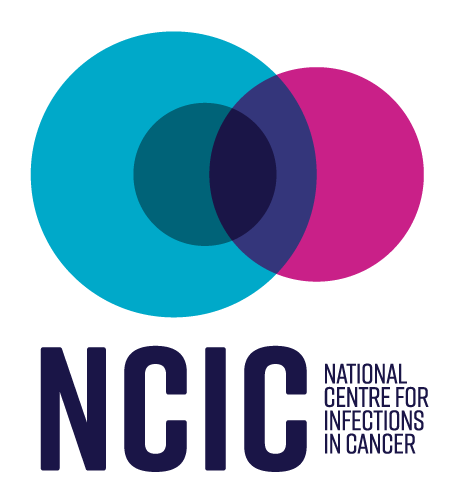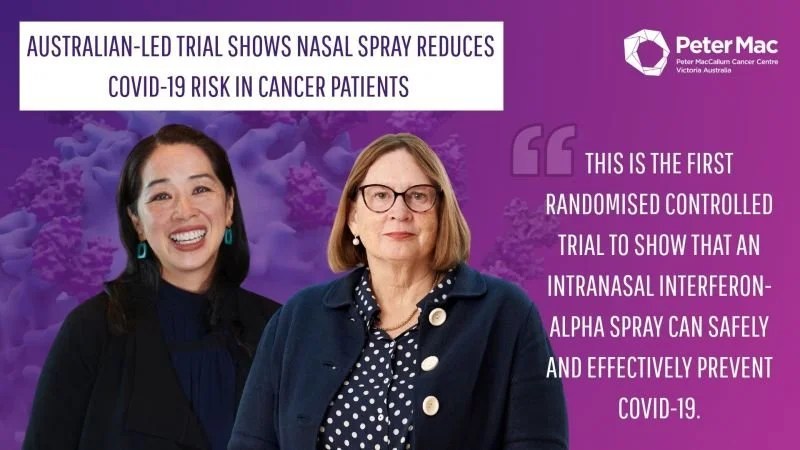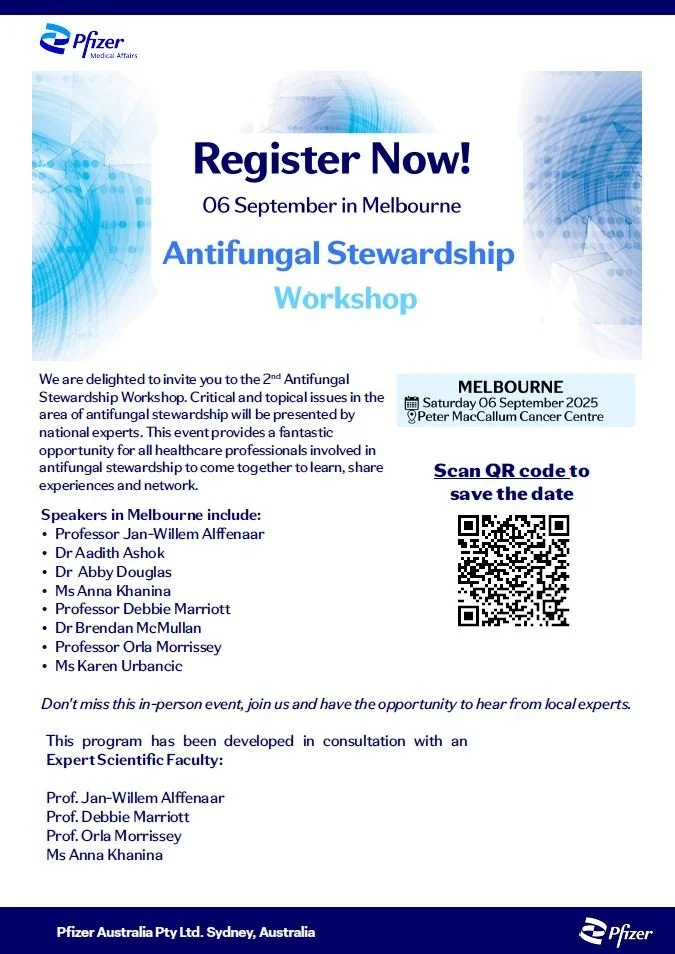Dear all,
Welcome to the September edition of the NCIC newsletter. It’s been a highly productive period at NCIC, with our teams advancing a broad spectrum of impactful research across transplant, cancer, and immunocompromised patient populations. Over the past few months, our work has included clinical trials, point prevalence studies, innovative diagnostic tools, and immune profiling, resulting in a number of key publications in leading journals such as Clinical Infectious Diseases, BMJ Open, Transplant Infectious Disease, Mycoses, and Clinical & Translational Immunology.
Research Updates
Recently published in Clinical Infectious Diseases, the C-Smart trial demonstrated that a nasal spray containing interferon-alpha (IFN-α)—a naturally occurring protein with broad antiviral properties—reduced the risk of COVID-19 infection by 40% compared with placebo.
The study gained significant media attention, with 44 articles published across Australia, the United States, Europe, and the United Kingdom. Collectively, print and broadcast coverage reached more than 310,000 people.
Congratulations to the team on this important collaboration, which represents a novel and impactful advance in protecting immunocompromised patients.
Senior author, Associate Professor Ben Teh, has recently led the development of new international guidelines for the management of Clostridioides difficile infection (CDI), a common and potentially serious gut infection.
Published by the 10th European Conference on Infections in Leukemia (ECIL-10), the guidelines provide evidence-based recommendations to address the unique challenges of diagnosing and treating CDI in haematology patients, who are at significantly higher risk of severe illness and complications.
We are pleased to announce that the protocol for the PROSPER point prevalence study - aiming to estimate the prevalence of key healthcare-associated and opportunistic infections in Australian transplant and cancer populations, has been published in BMJ Open (Volume 15, Issue 7, e100798).
This study represents Australia’s first multi-site, ICH-adapted point prevalence survey (PPS) focused on cancer and transplant patients, employing a surveillance methodology based on the European Centre for Disease Prevention and Control’s PPS protocol. It will capture crucial data on infection prevalence, current infection prevention and control practices, and surveillance strategies across multiple healthcare facilities.
With ethical approval secured from the Peter MacCallum Cancer Centre’s Human Research Ethics Committee, the study will enrich future IPC policy and surveillance frameworks tailored to this highly vulnerable population.
NCIC Recent Publications
Interferon-α Nasal Spray Prophylaxis Reduces COVID-19 in Cancer Patients: A Randomized, Double-Blinded, Placebo-Controlled Trial.
Yong MK, Thursky K, Crane M, Spelman T, Mahar RK, Simpson JA, Scott AM, Harrison SJ, Szer J, Pellegrini M, Lingaratnam S, Pang KC, Tennakoon S, Sim BZ, Blyth E, Gan HK, Quach H, McIntosh MP, Page H, Woolstencroft R, Slavin M. Clin Infect Dis. 2025 Aug 28:ciaf409. doi:10.1093/cid/ciaf409. Epub ahead of print. PMID:40874769From Guesswork to Guidelines: Advancing Diagnostic Stewardship in Immunocompromised Hosts.
Kinsella P, Thursky K, Slavin MA, Reynolds GK. Expert Rev Anti Infect Ther. 2025 Sep;23(9):723-737. doi:10.1080/14787210.2025.2545504. Epub 2025 Aug 18. PMID:40785091Automated Detection of Invasive Fungal Infections in Clinical Reports Using Medical Language Models.
Han W, Martinez D, Rozova V, Cavedon L, Khanina A, Worth LJ, Slavin MA, Thursky KA, Verspoor K. Stud Health Technol Inform. 2025 Aug 7;329:1002-1007. doi:10.3233/SHTI250990. PMID:40776008Elucidating Novel Immune Profiles for Predicting Infection in High-Risk Cohorts: A Pilot Study in Patients With Relapsed and Refractory Chronic Lymphocytic Leukaemia.
Williams LJ, Li-Wai-Suen CS, Garnham AL, Bader SM, Tam CS, Whitechurch A, Slavin MA, Doerflinger M, Teh BW. Clin Transl Immunology. 2025 Aug 3;14(8):e70049. doi:10.1002/cti2.70049. PMID:40766049; PMCID:PMC12318685Estimating the Prevalence of Key Healthcare-Associated and Opportunistic Infections in Australian Transplant and Cancer Populations: Protocol for the PROSPER Point Prevalence Study.
Garg P, Singh N, Liu AJ, Yong MK, Slavin MA, Hall L, Worth LJ. BMJ Open. 2025 Aug 1;15(7):e100798. doi:10.1136/bmjopen-2025-100798. PMID:40750274; PMCID:PMC12314944Current Practice Patterns and Educational Needs of Immunocompromised Infectious Diseases Physicians in Australia and New Zealand.
Marinelli T, Teh B, Giannella M, Ison MG, Roberts MB, Bupha-Intr O, Slavin M; Australasian Society for Infectious Diseases Immunocompromised Host Special Interest Group. Transpl Infect Dis. 2025 Jul 29:e70087. doi:10.1111/tid.70087. Epub ahead of print. PMID:40729421Clinical Characteristics and Outcomes in Patients With Cryptococcaemia From a Large Population-Based Cohort.
Stewart AG, Laupland KB, Edwards F, Gassiep I, Koo S, Hammond SP, Chen SC, Slavin MA. Mycoses. 2025 Jul;68(7):e70091. doi:10.1111/myc.70091. PMID:40626385Epidemiology, Significance and Clinical Outcomes of Bloodstream Infections Caused by Non-Candida and Non-Cryptococcus Yeasts.
Stewart AG, Laupland KB, Edwards F, Slavin MA, Chen SC. Mycoses. 2025 Jul;68(7):e70093. doi:10.1111/myc.70093. PMID:40626381Current Practice Patterns and Educational Needs of the ESCMID Study Group for Infections in Compromised Hosts.
Giannella M, Riccucci D, Pascale R, Cordero E, Mueller NJ, Slavin M, Ison M; ECCMID study groups on Invasive Fungal Infection and Infection in Immunocompromised Hosts. Transpl Infect Dis. 2025 Jul 8:e70076. doi:10.1111/tid.70076. Epub ahead of print. PMID:40625111
PMCC ID Unit meeting -Special Presentation: NCIC Showcase
Upcoming Events
Tomorrow is 2nd Antifungal Stewardship Workshop
Join us for the 2nd Antifungal Stewardship Workshop- a dynamic in-person event dedicated to exploring critical and emerging issues in antifungal stewardship.
Date: Saturday 6th of September
Location: Peter MacCallum Cancer Centre
Expressions of Interest for Full time Research Fellow Position
We also, taking expressions of interest for a full time Research Fellow position available for 2026. This research position is not accredited. AHPRA certification (or ability to gain) and at least 1-year advanced training in Infectious Diseases is highly desirable. You will be paid as a full time Research Assistant and will be embedded in our clinical research team. We are looking for local or international ID physicians who want to gain research and trials experience.
Please reach out to Monica.slavin@petermac.org if you would like to discuss either of these opportunities further.
Follow us!
We look forward to connecting with you on both LinkedIn and BlueSky.
Kind regards,
Prof Monica Slavin, MBBS, MD, FRACP, FAAHMS
Head, Department Infectious Disease, Peter MacCallum Cancer Centre
Professor of Infection in Cancer and Transplantation, University of Melbourne Department of Infectious Diseases and the Sir Peter MacCallum Department of Oncology
Director, National Centre for Infections in Cancer





